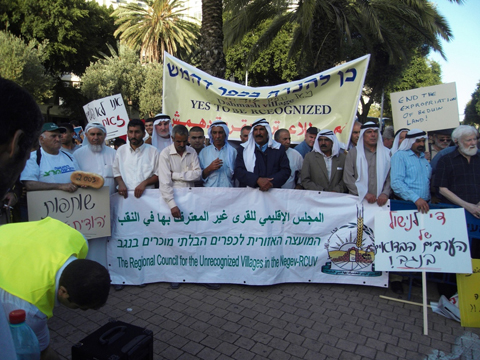
With global newspaper headlines brimming with Israeli and Iranian saber-rattling, this could be an opportune moment to implement controversial domestic policies, safely beyond the spotlight of the public eye. Alas, the Knesset, Israel’s parliament, is doing just that with a new bill on the ’Regulation of the Bedouin settlement in the Negev’. The bill is based on the ‘Prawer Plan’, which was approved by the cabinet in September last year. Once in effect, an overwhelming majority of the residents of the Negev desert’s unrecognized villages would be relocated and roughly two-thirds of the land would be confiscated by the Israeli government.
Sadly, the bill is just the tip of the iceberg and joins the ranks of a series of discriminatory measures implemented by the Israeli government over decades, all designed to gradually marginalize the already underprivileged Bedouin minority. The Bedouin-Arabs are an indigenous people that lived on Palestinian land long before the Israeli state came into existence. The main issue, at present, is that the government does not recognize Bedouin villages, let alone Bedouin land-ownership rights. Today, the almost 200,000 Bedouin-Arabs are among the most disadvantaged of Israeli citizens. As the government considers the Bedouin “spread” illegal, it refuses to deliver basic services such as running water, electricity, roads, proper education, and health and welfare services.
As recently as July 2010, Israeli forces demolished the homes of Bedouin citizens in the village of Al-Araqib in the southern Negev, destroying houses, olive groves and other structures, leaving more than 300 people homeless. The demolition followed shortly after Prime Minister Netanyahu’s comments about the Negev region being at risk of losing its Jewish majority. Bedouin-Arabs have the highest birth rates in the country and are thus viewed as a demographic threat to the Jewish population. Fifty years ago now, David Ben-Gurion suggsted that the Bedouin be herded into the north of the desert “in order not to disturb development plans” — and indeed, the Negev is the next Israeli frontier. It accounts for more than half of the country’s land but remains sparsely populated, making it an ideal site for new settlements that could accommodate the hundreds of thousands of Jewish immigrants the government is expecting in the coming years.
On the condition of renouncing claims to their ancestral land, the government offers its Bedouin citizens the right to resettle in seven existing government-planned townships. These cities, which were created during the 1990’s, were designed to relocate the rural population to urban communities. Today, those townships are among the eight poorest communities in Israel, facing high unemployment and lacking crucial infrastructure. Meanwhile, Jewish settlements built on former Bedouin land are generously subsidized by the government. What this means is that the Israeli government is refusing to provide all of its citizens with equal rights and opportunities. Now that’s a story worthy of the headlines.

